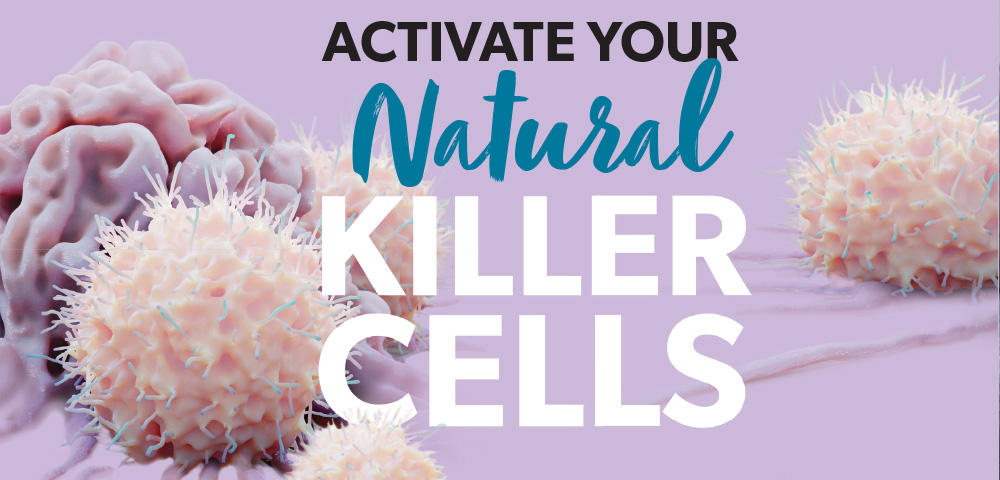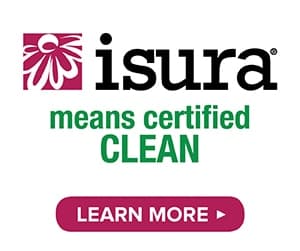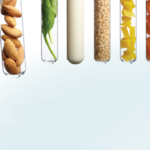
Like an athlete who prepares their mind and body for peak performance, we must also fine-tune parts of our immune system that work on our behalf every day to protect us against these invaders.
Vital to our protection and survival, our immune system defends against foreign invaders like bacteria and viruses from entering our body and causing harm. With the help of barriers and immune cells, this essential system strives to keep us healthy. Like an athlete who prepares their mind and body for peak performance, we must also fine-tune parts of our immune system that work on our behalf every day to protect us against these invaders.
Natural killer cells 101
There’s no shortage of information on ways to support our immune function. So, let’s draw our attention to how we can support one specific type of immune cell – natural killer (NK) cells. NK cells are a type of lymphocyte, or white blood cell, produced in areas such as the bone marrow, tonsils, and spleen. NK cells are primarily active against stressed cells, such as cancer and virus-infected cells, eliminating these by secreting cytokines, exhibiting direct cytotoxic effects, and regulating other immune cells.
Factors such as genetics, age, nutrition, and even physical activity can impact the function of NK cells. Any abnormalities of NK cells can lead to an increased risk of cancer development and infection. For example, deficiencies of specific micronutrients due to reduced energy intake, malabsorption, or drug-nutrient interactions as we age can lead to reduced immune responses. The good news is we can optimize NK cell function with nutrient and lifestyle changes.
Support your NK cells with key nutrients and physical activity
Probiotics
Our microbiota, simply known as our good bacteria, provides numerous health benefits including immune support. Although diet, age, medications, illness, and stress can greatly influence the composition of these microorganisms, probiotics are commonly recommended to support the microbiota and improve immune responses. In fact, NK cell activity may be improved by certain strains of probiotics, especially lactobacilli and bifidobacteria strains. Short-term probiotic supplementation has been shown to improve NK cell function in healthy elderly individuals. With several choices for probiotic supplements, be sure to select one that provides a broad spectrum of probiotic strains and has a guaranteed potency until the product’s expiry date. Fermented foods and high fibre intake also help promote a healthy microbiota.
Vitamin D
Widely known for promoting bone health, vitamin D can also impact immunity by influencing various immune cells. Vitamin D insufficiency and deficiency, as evaluated by a simple blood test, are associated with increased risk of infection and development of autoimmune diseases. Although vitamin D’s influence on NK cells is not completely understood, one study has suggested that maintaining serum levels of 30–40 ng/mL may be optimal for NK activity. Although sun exposure can help with vitamin D production, supplementation with vitamin D3 is often an appropriate strategy to support immune health and reduce the risk of acute respiratory tract infections. Adults can often supplement with 1000–2000 IU per day; however, dosage recommendations should be based on your current vitamin D status. Speak to your health care practitioner about assessing your vitamin D levels to establish a more accurate daily vitamin D3 dose.
Vitamin C
The antioxidant vitamin C can support immune defences by influencing the development, production, and function of lymphocytes and the integrity of the immune system’s physical barriers. Under the influence of vitamin C, NK cells may regenerate faster, and normal function of impaired NK cells may be restored. More research is needed in this area, but consuming foods rich in vitamin C, such as berries, oranges, and green leafy vegetables, along with supplementation, may be beneficial for NK cell function.
Selenium and zinc
Additional nutrients such as selenium and zinc have also been shown to support NK cell activity. Optimal selenium status can enhance T-cell proliferation, NK cell activity, and innate immune cell functions. Decreased NK cell activity may occur with zinc deficiency. Zinc impacts the functions of multiple enzymes found in lymphocytes. Support your selenium levels with foods such as Brazil nuts, fish, and whole grains, plus your zinc levels with pumpkin seeds, spinach, and animal proteins.
Physical activity
Along with appropriate nutrient intake, physical activity is known to augment immune function. In one study, lack of physical exercise was associated with a risk of very low NK cell activity, yet increased exercise provided immune benefits especially for women. Regular physical activity goes a long way in reducing community infection and mortality. Adults should engage in a variety of aerobic, muscle-strengthening, and balance activities to promote health. NK cells are critical to the immune system, and require a balanced approach of healthy eating, nutrient supplementation, stress management, and regular movement to support their function. Always strive to fine-tune components of your immune system to support its optimum performance.
References
- Abel AM, Yang C, Thakar MS, et al. Natural killer cells: Development, maturation, and clinical utilization. Front Immunol. 2018; 9:1869.
- Paul S, Lal G. The molecular mechanism of natural killer cells function and its importance in cancer immunotherapy. Front Immunol. 2017; 8:1124.
- Ravaglia G, Forti P, Maioli F, et al. Effect of micronutrient status on natural killer cell immune function in healthy free-living subjects aged >/=90 y. Am J Clin Nutr. 2000; 71(2):590-8.
- Grudzien M, Rapak A. Effect of natural compounds on NK cell activation. J Immunol Res. 2018; 2018:4868417.
- van Gorkom GNY, Klein Wolterink RGJ, van Elssen CHMJ, et al. Influence of vitamin C on lymphocytes: An overview. Antioxidants (Basel). 2018; 7(3):41.
- Oh S, Chun S, Hwang S, et al. Vitamin D and exercise are major determinants of natural killer cell activity, which is age- and gender-specific. Front Immunol. 2021; 12:594356.
- Chandra RK. Effect of vitamin and trace-element supplementation on immune responses and infection in elderly subjects. Lancet. 1992; 340:1124-7.
- Valdes AM, Walter J, Segal E, et al. Role of the gut microbiota in nutrition and health. BMJ. 2018; 361:k2179.
- Aziz N, Bonavida B. Activation of natural killer cells by probiotics. For Immunopathol Dis Therap. 2016; 7(1-2):41-55.
- Gui Q, Wang A, Zhao X, et al. Effects of probiotic supplementation on natural killer cell function in healthy elderly individuals: A meta-analysis of randomized controlled trials. Eur J Clin Nutr. 2020; 74(12):1630-7.
- Calder PC, Carr AC, Gombart AF, et al. Optimal nutritional status for a well-functioning immune system is an important factor to protect against viral infections. Nutrients. 2020; 12(4):1181.
- Charoenngam N, Holick MF. Immunologic effects of vitamin D on human health and disease. Nutrients. 2020; 12(7):2097.
- Carr AC, Maggini S. Vitamin C and immune function. Nutrients. 2017; 9(11):1211.
- Avery JC, Hoffmann PR. Selenium, selenoproteins, and immunity. Nutrients. 2018; 10(9):1203.














